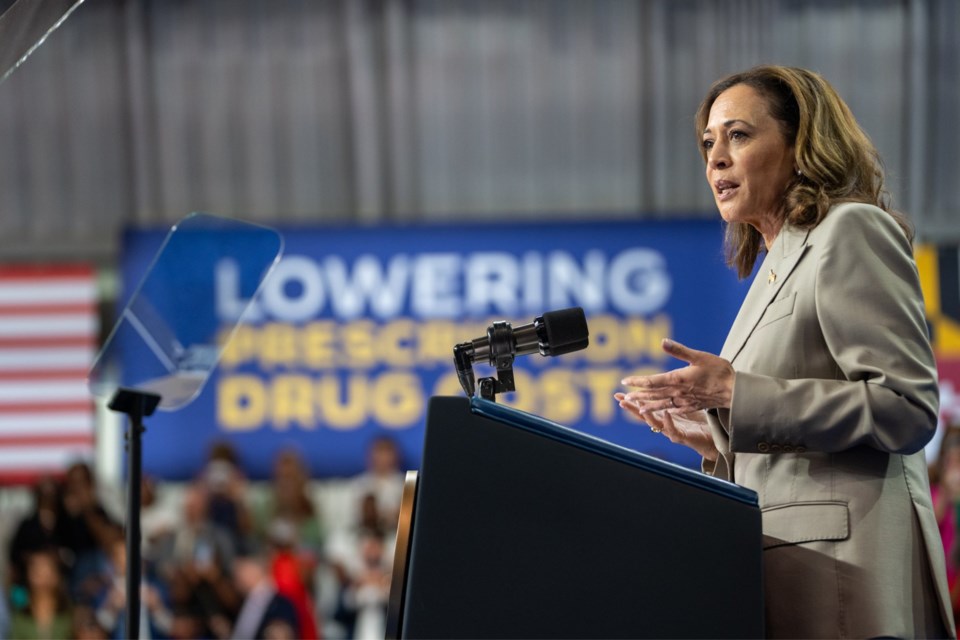Despite her achievements and strong platform, Kamala Harris’s election loss highlights the complexities of American politics—and it cuts deep. Although the result wasn’t what many had hoped for, there were wins along the way that are worth mentioning and celebrating.
As the first woman to serve as U.S. vice-president, Harris broke historic barriers while being held to higher standards. Throughout a gruelling campaign, she continuously brought critical issues to the forefront. Harris will forever serve as a powerful role model for women, girls and gender-diverse youth. She showed us a new face of leadership. However, the election outcome makes one thing clear: We need stronger media literacy and education to empower a public that can truly shape democracy.
We need a resilient, informed public able to navigate today’s charged political landscape, where misinformation and inflammatory rhetoric run high. This environment shapes voter perceptions, overshadowing policy facts and making it tough for candidates like Harris to cut through with truth-centred messages. Fear mongering used to be a risky political move, but the spread of misinformation has made it more powerful—and more common—than ever.
Building truth and accountability starts with helping people sort fact from opinion, policy from spin, and reliable sources from manipulation. We may not always grasp what shapes a family member’s beliefs or a colleague’s views, but we can come together in spaces like discussion groups, classrooms and employee resource groups—places that help us tell fact from fiction. By bringing media literacy, civics and critical thinking into education, we can give the next generation (and ourselves) the tools to engage thoughtfully, resist manipulation and strengthen democracy. Supporting credible journalism by paying for our news is part of this commitment.
Harris’s journey shows just how essential it is to build a foundation of truth and mutual respect, so people can make choices true to their values.
Several factors likely contributed to Harris’s defeat. As the first female and first woman of colour U.S. vice-president, she faced unique scrutiny. Research shows that women—especially women of colour—are often held to higher standards in leadership roles.
Harris entered the race with limited campaign time and mixed levels of support within her party, which gave her less opportunity to connect with voters. Her economic platform—focused on equitable growth and support for working families—stood apart from traditional messaging that emphasizes tax cuts and deregulation, and led some to see her as “light” on economic issues. Her emphasis on equity over corporate-focused metrics may have been hard for some voters to prioritize within a framework that often links fiscal prudence with conservative policies. However, her campaign told a different story, highlighting concrete achievements: The 2021 Child Tax Credit expansion lifted 2.9 million children out of poverty, and 16 million jobs have been added under the Biden administration, reducing unemployment to 4.1 per cent—a notable shift from the inequalities and job losses of the prior Trump administration.
Gender bias undoubtedly played a role in Harris’s journey. She conducted herself with integrity and connected with millions of Americans in just 90 days. Yet, she faced barriers tied to the biases surrounding her as a woman of colour running for the highest office—obstacles her opponent, exhibiting quite the opposite behaviour, largely avoided.
Despite these hurdles, Harris’s campaign united people across the U.S. and beyond. She raised crucial topics of economic justice, gender and reproductive rights, far from being “light” on issues affecting millions. Harris proved that advancing equity is both a moral imperative and a pathway to a sustainable future. Taking the high road throughout—no small feat in this election—she excelled in debates, tackled tough questions head-on and mobilized widespread support for her leadership. She broke countless barriers, showing resilience and redefining what leadership can look like in America. She did everything right.
Harris’s candidacy, even in loss, is a meaningful step forward. She’s opened doors for so many—women, young people, people of colour and everyone who believes in equity. As she put it: “In the darkness, you can see the stars.” Though she may not have taken this election, when we step back and consider what she accomplished, it’s a win.
She also stepped into a long tradition of “firsts.” Just as the first female board chair often follows a woman on the board, or a female managing partner follows a woman partner, Harris’s vice-presidency may pave the way for America’s first female president. Now is the time to keep pushing forward—to inspire young people to dream big and pursue their futures with purpose. To build a democracy rooted in opportunity and equity. As Harris said in her concession speech: “On the campaign, I would often say when we fight, we win. But here’s the thing. Sometimes the fight takes a while.” Onwards.
Chantelle Krish is CEO of Big Sisters of BC Lower Mainland.





